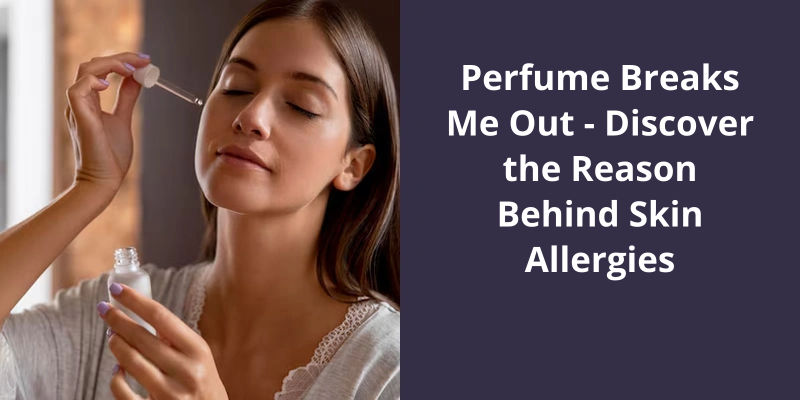Perfume breaks you out mostly because you may be allergic to some ingredients present in it. These allergies to certain chemicals, dyes, or natural ingredients in perfumes can cause your skin to react by breaking out in rashes or hives. This response is your body’s protective mechanism against substances it finds harmful. Fragrances are one of the most common causes of allergic contact dermatitis, a condition resulting in red, itchy, and often flaky skin. Patch testing is a common way to identify the specific allergen causing the reaction. To prevent these reactions, it’s advisable to opt for fragrance-free or hypoallergenic products. It’s also worth noting that even natural or organic fragrances can cause allergies as well, so it’s important to always do a patch test with any new products.

Can Perfume Make Your Chest Break Out?
Perfume is often considered a luxury and an essential part of many peoples daily routine. However, for some individuals, it can lead to unpleasant consequences, especially when it comes to skin allergies. The relationship between perfume and breakouts is a frequently debated topic, but it’s clear that there are certain scenarios where perfume can be a culprit.
One of the common complaints associated with perfume is the formation of acne on the chest. Just like scented laundry detergent, perfume contains various chemicals and ingredients that may irritate the skin. These irritants can disrupt the delicate balance of the skin, leading to inflammation and the development of acne. It’s important to note that everyones skin is different, and some individuals may be more sensitive to certain fragrances than others.
In addition to perfume, makeup can also contribute to breakouts on the chest. Similar to perfume, makeup products can contain ingredients that may clog the pores and disrupt the natural flow of sebum. This can result in the formation of pimples and acne in the chest area. It’s vital to choose non-comedogenic or oil-free makeup products to minimize the likelihood of experiencing breakouts.
The key to avoiding skin allergies caused by perfume and makeup lies in understanding your skins unique sensitivities. It’s essential to pay attention to any adverse reactions your skin may have after using certain products. If you notice that your chest breaks out after applying perfume or makeup, it’s recommended to consult with a dermatologist. They can help identify the specific ingredient causing the allergic reaction and provide guidance on suitable alternatives.
In general, it’s advisable to opt for fragrance-free or hypoallergenic products, especially if you’ve a history of sensitive skin. These products are specifically formulated to minimize the risk of skin allergies and are often gentler on the skin. Additionally, when applying perfume, consider spraying it on clothing rather than directly on the skin to reduce the potential for irritation.
The chemicals and ingredients in these products, particularly those found in scented variants, have the potential to irritate the skin and clog pores. By being mindful of the products you use and their impact on your skin, you can take steps to minimize the likelihood of experiencing breakouts and skin allergies.
Perfumes and colognes are composed of a complex blend of chemicals, some of which have the potential to cause allergic reactions. For those sensitive to fragrances, exposure to these sensitizing chemicals can lead to mild to severe allergic symptoms. It’s important for individuals with fragrance allergies to understand the potential risks associated with widespread exposure to strong perfumes and colognes, as contact sensitization can occur.
Why Am I Allergic to Strong Perfume?
Fragrance sensitivity is a common issue among individuals, and it’s important to understand why some people are specifically allergic to strong perfume. Typically, a regular perfume or cologne contains around 14 chemical ingredients that have the potential to trigger allergic reactions in those who’re sensitive to fragrances. The severity of these reactions can range from mild to severe, depending on the individuals sensitivity levels.
Identifying the specific chemicals in perfumes that cause allergies can be challenging due to the complex nature of fragrance formulations. However, common allergens found in perfumes include substances such as citrus oils, fragrance oils, and synthetic musks. These allergens can cause symptoms like redness, itching, swelling, and even blisters on the skin.
To determine the specific cause of a fragrance allergy, it’s crucial to visit a dermatologist or allergist. They can conduct patch testing to pinpoint the exact allergen responsible for the allergic reaction. Once the culprit is identified, individuals can make informed choices and avoid products containing that specific allergen.
If you find that you’re allergic to strong perfume, it’s crucial to avoid using such products or opt for fragrance-free alternatives. Additionally, it’s essential to check product labels for potential allergens and choose hypoallergenic options when available.
Applying perfume to your face may seem tempting, especially when aiming for a pleasant scent all over. However, it’s crucial to remember that perfume isn’t designed for facial application. It’s purpose lies in enhancing the natural aroma of your pulse points, where body heat intensifies scent dispersion. So, let’s explore why it’s best to refrain from putting perfume directly on your face and explore safer alternatives for fragrance enthusiasts.
Is It OK to Put Perfume on Your Face?
Is it OK to put perfume on your face? No! Perfume is meant to be worn on the pulse points on your body, not on your face. A pulse point is an area on your skin with the most or constant blood flow. This means that the area is hotter than other areas on your skin, allowing the fragrance to be released and dispersed more effectively. Common pulse points include the wrists, neck, behind the ears, and inside the elbows.
First, facial skin tends to be more sensitive than other parts of the body. The delicate skin on your face may react negatively to the ingredients in the fragrance, leading to irritation, redness, or even breakouts. Secondly, perfume contains alcohol, which can be drying for the skin. Alcohol can strip the natural oils from your face, disrupting the skins moisture barrier and causing potential irritation.
Furthermore, fragrance ingredients are complex and can vary from product to product. Some of these ingredients, such as certain essential oils or synthetic fragrances, have the potential to cause allergies or sensitivities. When applied to the face, these ingredients can come into contact with sensitive areas like the eyes, nose, and mouth, increasing the risk of irritation or allergic reactions.
If you enjoy a scented experience for your face, it’s recommended to opt for facial products specifically formulated with fragrance or essential oils. These products have been tested and designed to be suitable for facial use, taking into consideration the unique needs and sensitivity of the facial skin. Always patch test new products before applying them to your face to avoid any unfavorable reactions.
The sensitive nature of facial skin and the potential allergenic ingredients in perfume make it a risky choice.
Alternatives to Perfume for Adding Scent to Your Facial Routine
- Fragrance-free moisturizers with natural essential oils
- Aromatherapy using essential oil diffusers
- Herbal steams with dried flowers and herbs
- Natural face mists made from floral hydrosols
- Homemade facial masks using fresh ingredients like cucumber or citrus fruits
- Scented face powders made with natural botanical extracts
- Infused water sprays with fresh herbs like mint or rosemary
- Natural floral waters like rose or lavender
- Scented facial oils with natural fragrant botanicals
- Herbal facial steam baths with chamomile or lavender
Conclusion
In conclusion, sensitive skin reactions to perfumes can be a frustrating and uncomfortable experience. If you find that perfume breaks you out, it’s crucial to understand that the culprit is likely fragrances present in these products. By recognizing your skin's sensitivity and avoiding fragranced products, you can prevent painful bumps, acne, and irritations on your face and neck. It’s recommended to opt for fragrance-free alternatives and to apply perfume to less sensitive areas of your body, such as your wrists and behind your ears. This way, you can still enjoy your signature scent without compromising your skin's health and appearance. Taking the necessary precautions and being aware of the potential triggers can help you maintain a positive relationship with fragrances while prioritizing the well-being of your skin.





